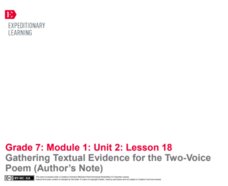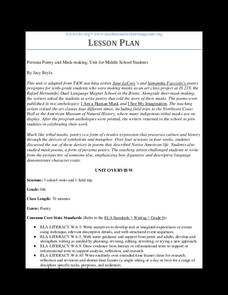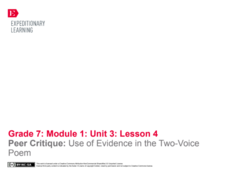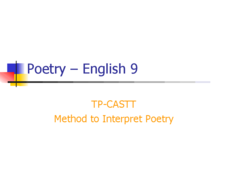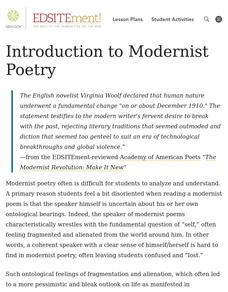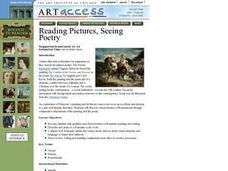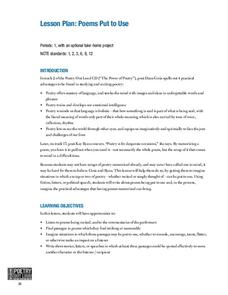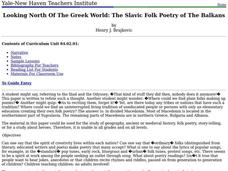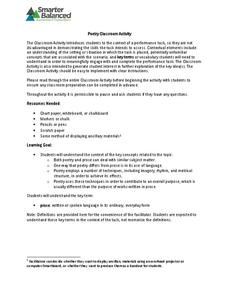EngageNY
Gathering Textual Evidence for the Two-Voice Poem (Author’s Note)
Writers take a look at how to gather evidence from the information text in the unit that connects to Salva and Nya’s story. They complete a Gathering Evidence from Informational Texts sheet to guide their work. Pupils then use the...
K12 Reader
Literature About Chicago: Prose vs. Poetry
In this comprehension exercise, readers compare Carl Sandburg's "Chicago" to a description of the city from Upton's Sinclair's The Jungle.
Novelinks
Tuck Everlasting: Similes, Metaphors, and Personification in Imagery
Poetic language is abundant in Natalie Babbitt's beautiful novel, Tuck Everlasting. Learners note the examples of similes, metaphors, and personification they find as they read, and illustrate how the language creates a sensory...
A to Z Teacher Stuff
The Gingerbread Man
You may not be able to catch the Gingerbread Man, but you can sing a catchy song about him! Incorporate a poem into a study of poetry and/or the alphabet in the weeks leading up to Christmas.
Teachers & Writers Magazine
Persona Poetry and Mask-Making
Looking to engage scholars in poetry with hands-on activities? What better way than making masks? Readers analyze literary devices in poetry, examine Native American masks, create their own masks, and then write poems to tell its story!
EngageNY
Peer Critique: Use of Evidence in the Two-Voice Poem
Peer editors review critique expectations before offering feedback on each other's two-voice poems. They record their feedback on peer critique recording forms, and then begin revising their poems.
Curated OER
Figurative Language
What is figurative language, and why do we use it? Introduce your high schoolers to some examples and discuss the importance of including this element in your writing. After studying a text and searching for examples, writers will...
EngageNY
Writing the Final Narrative: Monologue or Concrete Poem
Get inspired to help those creative juices flow. Using the resource, scholars write their final, best version of their narrative monologues or concrete poems. Next, they prepare for a performance task by watching and discussing a video...
Curated OER
Figurative and literal language through the study of Shakespeare
Sixth graders explore figurative and literal language. They study literary devices through short pieces of Shakespeare's work. Then investigate Shakespeare's works and life.
Alabama Learning Exchange
Poetry-English 9
Are your readers lost in the world of poetry? Show them this basic presentation to study elements of a poem. They learn the importance of the title, paraphrasing, connotation, tone, shifts, and theme.
Curated OER
Poetry Assignment Instead of a Test
"The Last Song" by Bernie Taupin and Elton John is the inspiration for an analysis assignment. Individuals read the song and answer nine questions about the speaker, figurative language, and significance of the lyrics. Use this as an...
Curated OER
Introduction to Modernist Poetry
Students examine the concept of modernism. They analyze different modern poetists writings and identify the context in which the poems were written. They write poems of their own to complete the activity.
Curated OER
The Kite Runner: Setting Poem
To gain a deeper understanding of the importance of the settings in The Kite Runner, readers use the provided poem frame to create three poems, one for each of the settings in Hosseini's novel.
Curated OER
Reading Pictures, Seeing Poetry
Students examine the painting, The Combat of the Giaour and Hassan based on a poem by Lord Byron. They compare how Romantic artists and writers made choices about visual elements and language to depict their subjects.
Poetry Out Loud
Poems Put to Use
Why do we have to study poetry? Here is a lesson that demonstrates some of poetry's more practical and real-world applications for reluctant learners. Start by leading a brainstorming session about where poems or pieces of poems might be...
Curated OER
Seven Poems, Seven Paintings: A Teacher's Guide to Selected Holocaust Poetry
Seven poems paired with seven original works of art provide learners an opportunity to draw connections between literary and artistic interpretations. Designed to augment a study of the Holocaust, each pair is accompanied by discussion...
Teachers.net
Figurative Language
When is a staple remover a fanged monster? In your ELA classroom when you're teaching this fun figurative language instructional activity, of course! Get your young writers using figurative language by making a game of it. Give groups a...
Curated OER
Teaching the Holocaust Through Poetry
W.H. Auden’s poem “Refugee Blues” launches a study of the problems of refugees. Background information about the poem and general information about Jewish refugees from Germany and Austria are provided, as are discussion questions and...
Curated OER
"Take my Advice": Poems with a Voice
Discuss the meaning of the phrase tone of voice with the class. They respond to a variety of scenarios where a particular tone would be prevalent. They then read "Mother to Son" without knowing the title and answer some questions about...
Curated OER
English Literature: An Overview
Relate literary works and authors to the major themes of English literature from the Anglo-Saxon period through the 20th century. Working in groups, high schoolers will evaluate period philosophy, religion, and politics that influenced...
Curated OER
Discussing Poetry In Class
Students investigate syllabic metre and rhyming techniques by analyzing poetry. In this language arts lesson, students read the poem Considering the Snail and discuss the nature and mood of the poem with their classmates. Students...
Curated OER
Looking North Of The Greek World: The Slavic Folk Poetry of The Balkans
Showing how folk poetry keeps alive national heritage is the stated goal of this proposal for a unit on the poetry of the Balkans.
Curated OER
I Can Write a Poem
Using an outline, learners write a poem. The poem is focused on highlighting their experiences. This is a great way to combine language arts and an exploration of self esteem.
Smarter Balanced
Poetry
How does poetry differ from other forms of writing? Class members view two writing samples, decide which one is a poem, and then identify the criteria they used to distinguish between the two samples.


